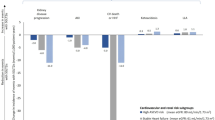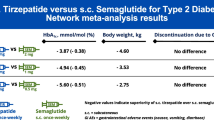Abstract
In randomized controlled trials (RCTs), more intensive glucose control in patients with type 2 diabetes leads to a modest (9%) reduction in major cardiovascular events (MACE), associated with a 20% reduction of kidney events and 13% reduction of eye events. The FDA issued guidance in 2008 led to the conduct of numerous cardiovascular outcomes (CVOT) trials to assess cardiovascular safety of new antihyperglycemic therapies in patients with type 2 diabetes. The results of these trials show that insulin glargine, three different dipeptidyl peptidase-4 (DPP-4) inhibitors (saxagliptin, alogliptin, and sitagliptin) and lixisenatide (a glucagon like peptide-1 receptor agonist) produce no significant difference in CVOT when compared with usual care or placebo. Other trials with newer diabetes drugs, including empagliflozin and canagliflozin (two sodium-glucose co-transporter-2 inhibitors), liraglutide and semaglutide (two GLP-1 receptor agonists) succeeded in demonstrating CV benefit in people with type 2 diabetes. In the last two decades, the equation “diabetes equals myocardial infarction” have contributed to the development of preventive therapy for risk factors in diabetes. In both primary and secondary prevention, the diabetic patients with high rates of statin and aspirin treatment have improved CV outcome, as compared with non-users. The drugs used to reduce glucose levels in patients with type 2 diabetes seem important for the ultimate cardiovascular outcome: the combination of intensive glycemic control, when safely attainable, with newer diabetes drugs (empagliflozin, canagliflozin, liraglutide, and semaglutide) may decrease the incidence of MACE, nephropathy and retinopathy. Moreover, depending on the drug used, CV mortality and heart failure may also be reduced.

Similar content being viewed by others
References
E.W. Gregg, X. Zhuo, Y.J. Cheng, A.L. Albright, K.M. Narayan, T.J. Thompson, Trends in lifetime risk and years of life lost due to diabetes in the USA, 1985–2011: a modeling study. Lancet Diabetes Endocrinol. 2, 867–874 (2014)
D.M. Nathan, J.B. Buse, S.E. Kahn et al., GRADE Study Research Group, Rationale and design of the glycemia reduction approaches in diabetes: a comparative effectiveness study (GRADE). Diabetes Care 36, 2254–2261 (2013)
F.M. Turnbull, C. Abraira, R.J. Anderson et al., Intensive glucose control and macrovascular outcomes in type 2 diabetes. Diabetologia 52, 2288–2298 (2009)
UK Prospective Diabetes Study (UKPDS) Group, Intensive blood-glucose control with sulphonylureas or insulin compared with conventional treatment and risk of complications in patients with type 2 diabetes (UKPDS 33). Lancet 352, 837–853 (1998)
The Action to Control Cardiovascular Risk in Diabetes Study Group, Effects of intensive glucose lowering in type 2 diabetes. N. Engl. J. Med. 358, 2545–2559 (2008)
The ADVANCE Collaborative Group, Intensive blood glucose control and vascular outcomes in patients with type 2 diabetes. N. Engl. J. Med. 358, 2560–2572 (2008)
W. Duckworth, C. Abraira, T. Moritz et al., Glucose control and vascular complications in veterans with type 2 diabetes. N. Engl. J. Med. 360, 129–139 (2009)
S. Zoungas, H. Arima, H.C. Gerstein et al., Collaborators on Trials of Lowering Glucose (CONTROL) group, Effects of intensive glucose control on microvascular outcomes in patients with type 2 diabetes: a meta-analysis of individual participant data from randomized controlled trials. Lancet Diabetes Endocrinol. 5, 431–377 (2017)
FDA, Department of Health and Human Services, Food and Drug Administration, Center for Drug Evaluation and Research (CDER). Diabetes mellitus—evaluating cardiovascular risk in new antidiabetic therapies to treat type 2 diabetes: guidance for industry. http://www.fda.gov/downloads/Drugs/GuidanceComplianceRegulatoryInformation/Guidances/ucm071627.pdf. Accessed December 2008
ORIGIN trial Investigators, Basal insulin and cardiovascular and other outcomes in dysglycemia. N. Engl. J. Med. 367, 319–328 (2012)
ORIGIN Trial Investigators, Basal insulin glargine and microvascular outcomes in dysglycaemic individuals: results of the outcome reduction with an initial glargine intervention (ORIGIN) trial. Diabetologia 57, 1325–1331 (2014)
B.M. Scirica, D.L. Bhatt, E. Braunwald et al., SAVOR-TIMI 53 steering committee and investigators, saxagliptin and cardiovascular outcomes in patients with type 2 diabetes mellitus. N. Engl. J. Med. 369, 1317–1326 (2013)
W.B. White, C.P. Cannon, S.R. Heller et al., EXAMINE Investigators, Alogliptin after acute coronary syndrome in patients with type 2 diabetes. N. Engl. J. Med. 369, 1327–1335 (2013)
J.B. Green, M.A. Bethel, P.W. Armstrong et al., TECOS Study Group, Effect of sitagliptin on cardiovascular outcomes in type 2 diabetes. N. Engl. J. Med. 373, 232–242 (2015)
O. Mosenzon, G. Leibowitz, D.L. Bhatt et al., Effect of saxagliptin on renal outcomes in the SAVOR-TIMI 53 trial. Diabetes Care 40, 69–76 (2017)
M. Monami, I. Dicembrini, E. Mannucci, Dipeptidyl peptidase-4 inhibitors and heart failure: a meta-analysis of randomized clinical trials. Nutr. Metab. Cardiovasc. Dis. 24, 689–697 (2014)
M.A. Pfeffer, B. Claggett, R. Diaz et al., ELIXA investigators, Lixisenatide in patients with type 2 diabetes and acute coronary syndrome. N. Engl. J. Med. 373, 2247–2257 (2015)
B. Zinman, C. Wanner, J.M. Lachin et al., EMPA-REG OUTCOME Investigators, Empagliflozin, cardiovascular outcomes, and mortality in type 2 diabetes. N. Engl. J. Med. 373, 2117–2128 (2015)
S.P. Marso, G.H. Daniels, K. Brown-Frandsen et al., LEADER Trial Investigators, Liraglutide and cardiovascular outcomes in type 2 diabetes. N. Engl. J. Med. 375, 311–322 (2016)
C.C. Low Wang, C.N. Hess, W.R. Hiatt, A.B. Goldfine, Clinical update: cardiovascular disease in diabetes mellitus: atherosclerotic cardiovascular disease and heart failure in type 2 diabetes mellitus—mechanisms, management, and clinical considerations. Circulation 133, 2459–2502 (2016)
S.P. Marso, S.C. Bain, A. Consoli et al., SUSTAIN-6 Investigators, Semaglutide and cardiovascular outcomes in patients with type 2 diabetes. N. Engl. J. Med. 375, 1834–1844 (2016)
B. Neal, V. Perkovic, K.W. Mahaffey, et al., CANVAS Program Collaborative Group, Canagliflozin and cardiovascular and renal events in type 2 diabetes. N. Engl. J. Med. 377, 644–657 (2017)
C. Wanner, S.E. Inzucchi, J.M. Lachin et al., EMPA-REG OUTCOME Investigators, Empagliflozin and progression of kidney disease in type 2 diabetes. N. Engl. J. Med. 375, 323–334 (2016)
S.P. Marso, D.K. McGuire, B. Zinman, et al., DEVOTE Study Group, Efficacy and safety of degludec versus glargine in type 2 diabetes. N. Engl. J. Med. 377, 723–732 (2017)
S.M. Haffner, S. Lehto, T. Rönnemaa, K. Pyörälä, M. Laaks, Mortality from coronary heart disease in subjects with type 2 diabetes and in nondiabetic subjects with and without prior myocardial infarction. N. Engl. J. Med. 339, 229–234 (1998)
K.K.W. Olesen, M. Madsen, G. Egholm et al., Patients with and without diabetes without significant angiographic coronary artery disease have the same risk of myocardial infarction in a real-world population receiving appropriate prophylactic treatment. Diabetes Care 40, 1103–1110 (2017)
N.J. Pagidipati, A.M. Navar, K.S. Pieper, et al., On behalf of the TECOS Study Group, Secondary prevention of cardiovascular disease in patients with type 2 diabetes: international insights from the TECOS trial. Circulation. (2017). https://doi.org/10.1161/CIRCULATIONAHA.117.027252
Author information
Authors and Affiliations
Corresponding author
Ethics declarations
Conflict of interest
D.G received speaker fee from Lilly, NOVO, Sanofi, Roche and Novartis; K.E. received speaker fee from NOVO, Sanofi, Roche, Novartis, and Merck. The remaining authors declare that they have no competing interests.
Ethical approval
This article does not contain any studies with human participants performed by any of the authors.
Additional information
Dario Giugliano, Maria Ida Maiorino, Giuseppe Bellastella and katherine Esposito contributed equally to this work.
Rights and permissions
About this article
Cite this article
Giugliano, D., Maiorino, M.I., Bellastella, G. et al. Type 2 diabetes and cardiovascular prevention: the dogmas disputed. Endocrine 60, 224–228 (2018). https://doi.org/10.1007/s12020-017-1418-y
Received:
Accepted:
Published:
Issue Date:
DOI: https://doi.org/10.1007/s12020-017-1418-y




